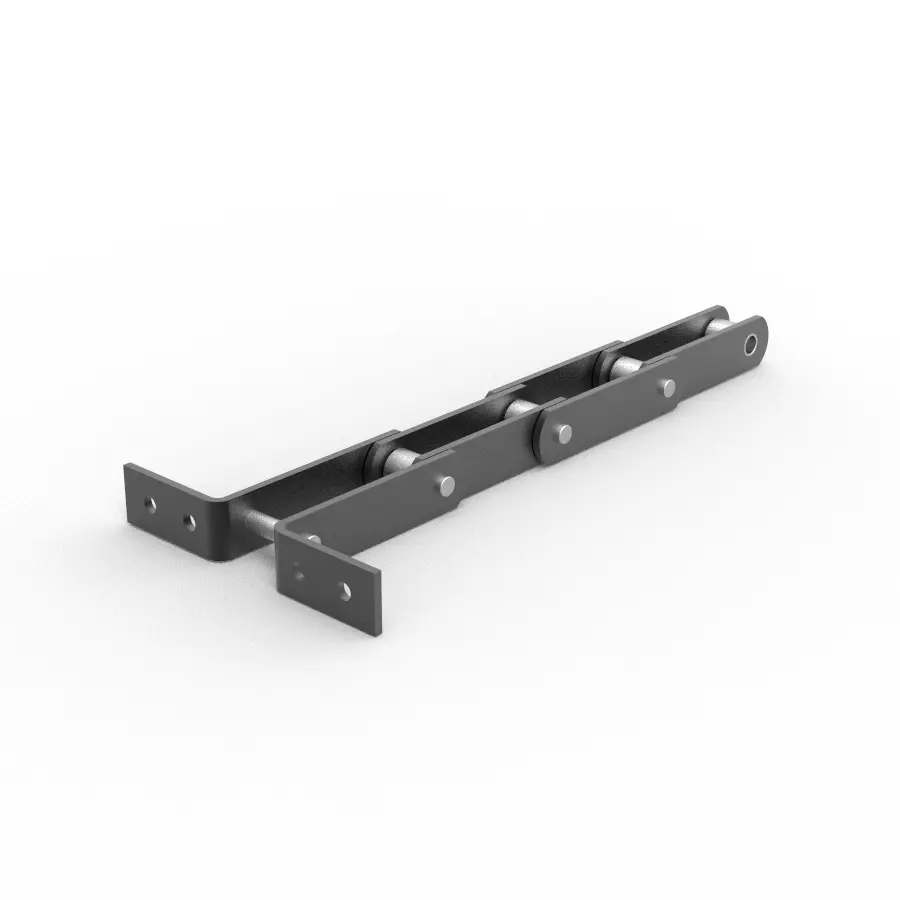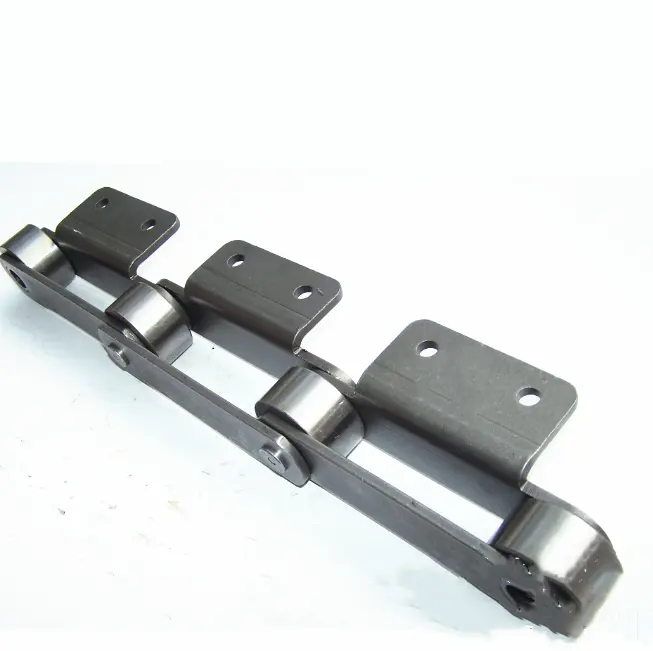Product Description
Product Description
1, Our Chain types: Agricultural roller chain, class crate conveyor chain, cast chain, combination chain, sugar industry chain, motorcycle roller chain, roller chains, bakery industry chain, weld steel drag chains,coil conveyor chain, palm oil chain etc;
2, Main materials: It is 40Mn. 40Cr, 45Mn alloy steel, SUS304, and POM Plastic for plates, 10#, 20#, 20CrMnMo, 30CrMnTi for pins and rollers;
3, Heat treatment: Carburizing, Austemper Stressing, nitro-caburizing harden etc;
4, Surface: Shot peening, black, blue or original;
Detailed Photos
For example of CC class crate conveyor chain CC600, CC400, CC175, CC625, F801,CC1300, C188
Product Parameters
Packaging & Shipping
plastic bag+carton+ OSB Case
Shipping way: these products will be shipped to your local port by sea, these also could be sent to your specific address by air.
Our Advantages
Our chains could be customized according to your actual order quantity, actual drawing and actual requirement. We have own chain process workshop, heat treatment workshop, process equipments and experienced designers.
(01)Assembled workshop
(02)Punching plate workshop
(03)Plate fabrication workshop
(04)Heat treatment workshop
(05)Shot peening workshop
(06) our warehouse
After Sales Service
Our products can be repaired or replaced the new parts with free cost in six months.
| Material: | Alloy |
|---|---|
| Structure: | Combined Chain |
| Surface Treatment: | Carburizing and Quenching |
| Chain Size: | 2.609inch |
| Feature: | Heat Resistant |
| Sidebar Diameter: | 1.13inch |
| Samples: |
US$ 52/Meter
1 Meter(Min.Order) | |
|---|
| Customization: |
Available
| Customized Request |
|---|
Can mill chains be used in wastewater treatment and sewage systems?
Yes, mill chains can be used in wastewater treatment and sewage systems for various applications. These chains offer specific advantages that make them suitable for such environments, where exposure to corrosive and abrasive materials is common. Here are some key points regarding the use of mill chains in wastewater treatment and sewage systems:
1. Corrosion Resistance: Wastewater and sewage often contain corrosive substances, such as acids and chemicals. Stainless steel mill chains are particularly beneficial in these environments due to their corrosion resistance, which helps to prevent premature wear and elongation of the chain.
2. Abrasion Resistance: Mill chains are designed to handle heavy loads and resist wear and abrasion, making them suitable for applications where wastewater may contain abrasive particles, sediment, or sludge.
3. Reliability: In wastewater treatment and sewage systems, reliability is crucial to maintain smooth operations. Mill chains, when properly selected and maintained, provide reliable performance and minimize downtime.
4. High Strength: Mill chains are capable of handling heavy loads and high-capacity material transfer, making them suitable for wastewater treatment processes that involve moving large volumes of liquid or solid materials.
5. Easy Maintenance: Stainless steel mill chains require minimal maintenance, which is beneficial in wastewater treatment facilities where regular maintenance can be challenging due to the nature of the environment.
6. Resistance to Harsh Chemicals: Wastewater treatment processes often involve the use of various chemicals for treatment and purification. Stainless steel mill chains can withstand exposure to these chemicals without deteriorating or compromising their performance.
7. Extended Service Life: Due to their corrosion and abrasion resistance, mill chains can have a longer service life in wastewater treatment and sewage systems compared to conventional carbon steel chains.
8. Versatility: Mill chains come in various configurations, including standard, double pitch, and heavy-duty options, allowing for versatility in designing wastewater treatment systems to meet specific requirements.
Overall, mill chains, especially those made of stainless steel, are a reliable and durable option for use in wastewater treatment and sewage systems. Their corrosion and abrasion resistance, high strength, and low maintenance make them well-suited for handling the challenging conditions and materials encountered in these applications.
What are the benefits of using a plastic mill chain in specific environments?
Plastic mill chains offer several advantages in specific environments where traditional metal chains may not be as suitable. These chains are made from various durable plastics, such as polyethylene, nylon, or acetal, which provide unique benefits in certain applications. Here are some of the advantages of using a plastic mill chain:
- Corrosion Resistance: Plastic mill chains are highly resistant to corrosion, making them an excellent choice for environments where exposure to chemicals or moisture is a concern.
- Chemical Resistance: Certain plastics used in mill chains have excellent chemical resistance properties, allowing them to withstand exposure to various chemicals without degradation.
- Lightweight: Plastic mill chains are lighter than their metal counterparts, reducing the overall weight of the conveyor system and making them easier to handle and install.
- Quiet Operation: Plastic chains produce less noise during operation compared to metal chains, making them suitable for applications where noise reduction is essential.
- Self-Lubricating: Some plastic materials used in mill chains are self-lubricating, reducing the need for additional lubrication and maintenance.
- Low Friction: Plastic chains have low friction properties, resulting in less wear and extending the chain’s lifespan.
- Non-Magnetic: Plastic chains are non-magnetic, making them suitable for applications where magnetic interference must be avoided.
- Specific Application Uses: Plastic mill chains are often used in industries such as food processing, pharmaceuticals, and electronics, where metal chains may not be permissible due to contamination concerns.
It’s important to note that plastic mill chains may not be suitable for heavy-duty applications or environments with high temperatures and abrasive materials. However, in specific industries and environments where their unique properties are advantageous, plastic mill chains offer a reliable and efficient conveying solution.
Can mill chains handle heavy loads and high-capacity material transfer?
Yes, mill chains are specifically designed to handle heavy loads and high-capacity material transfer in various industrial applications. These chains are built to withstand the demands of heavy-duty material handling processes and are commonly used in industries like steel manufacturing, mining, lumber handling, and more. Here’s why mill chains are suitable for such tasks:
1. High Tensile Strength: Mill chains are made from high-quality materials, such as carbon steel or stainless steel, which provide them with excellent tensile strength. This allows them to bear heavy loads without deformation or failure.
2. Robust Construction: The design of mill chains includes robust components and attachments that can handle the stress of heavy loads and maintain their integrity during material transfer.
3. Large Pitch Size: Mill chains typically have larger pitch sizes compared to standard roller chains. The larger pitch allows for greater material clearance between chain links, making them suitable for transferring bulky materials and handling large loads.
4. Attachment Options: Mill chains can be customized with various attachments, such as scrapers, pushers, or carrying rollers, to suit the specific requirements of material handling processes. These attachments enhance the efficiency and effectiveness of high-capacity material transfer.
5. Smooth Operation: Despite their ability to handle heavy loads, mill chains are designed for smooth and consistent operation. This ensures that the material transfer process remains stable and reliable, preventing potential disruptions in industrial operations.
6. Resistance to Wear and Corrosion: Mill chains are engineered to resist wear and corrosion, even in harsh and abrasive environments. This extends their service life and ensures reliable performance in demanding applications.
7. Safety Considerations: The design and construction of mill chains prioritize safety during high-capacity material transfer. They are manufactured to meet industry standards and undergo rigorous testing to ensure safe and efficient operation.
Overall, the combination of high tensile strength, robust construction, and versatility makes mill chains well-suited for handling heavy loads and facilitating high-capacity material transfer in various industrial settings. Their reliability and efficiency contribute to smoother and more productive material handling operations in industries dealing with substantial volumes of materials.
editor by CX 2023-09-05




